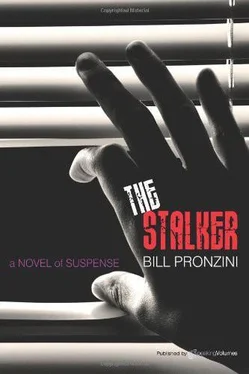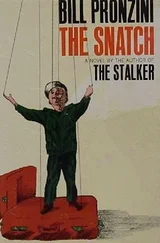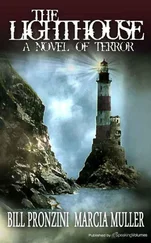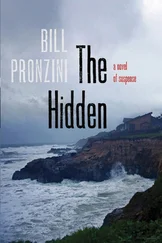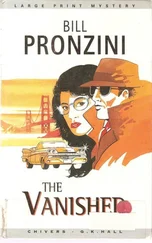Bill Pronzini - The Stalker
Здесь есть возможность читать онлайн «Bill Pronzini - The Stalker» весь текст электронной книги совершенно бесплатно (целиком полную версию без сокращений). В некоторых случаях можно слушать аудио, скачать через торрент в формате fb2 и присутствует краткое содержание. Жанр: Старинная литература, на английском языке. Описание произведения, (предисловие) а так же отзывы посетителей доступны на портале библиотеки ЛибКат.
- Название:The Stalker
- Автор:
- Жанр:
- Год:неизвестен
- ISBN:нет данных
- Рейтинг книги:4 / 5. Голосов: 1
-
Избранное:Добавить в избранное
- Отзывы:
-
Ваша оценка:
- 80
- 1
- 2
- 3
- 4
- 5
The Stalker: краткое содержание, описание и аннотация
Предлагаем к чтению аннотацию, описание, краткое содержание или предисловие (зависит от того, что написал сам автор книги «The Stalker»). Если вы не нашли необходимую информацию о книге — напишите в комментариях, мы постараемся отыскать её.
The Stalker — читать онлайн бесплатно полную книгу (весь текст) целиком
Ниже представлен текст книги, разбитый по страницам. Система сохранения места последней прочитанной страницы, позволяет с удобством читать онлайн бесплатно книгу «The Stalker», без необходимости каждый раз заново искать на чём Вы остановились. Поставьте закладку, и сможете в любой момент перейти на страницу, на которой закончили чтение.
Интервал:
Закладка:
He reached the path and began the ascent, eyes cast on the surface barely discernible beneath his canvas shoes. He climbed steadily, surely, feeling the wind tug at his body, clinging to rocks and craggy overhangs, breathing deeply through his mouth. Finally he reached the ledge-like area at the foot of the dirt slope; he paused there, his back to the path’s edge and to the gray nothingness, drawing air into his labored lungs, not looking up.
And then out of the ashen swirling vapor comes a stealthy shadowed movement and a face appears as if by some strange necromancy, disembodied, floating, a terrible white face Jim Conradin recognizes almost instantly, but before he can think or speak or act, a hand appears below the face and thrusts itself against his chest, thrusts with such tremendous force that Conradin, who is standing flat-footed and unprepared, flies backward to the rim of the precipice and his canvas shoes slip on the moist vegetation and suddenly he is touching air, touching emptiness, falling, falling, turning in a graceless somersault like a puppet with its strings cut, mouth opening to emit a short piercing scream that lasts for only a second or two, ending abruptly as first his torso and then his head strike a jagged outcropping of rock, splitting his head open like kindling under a woodsman’s axe, killing him instantly, and his body plummets off the convexity of the cliff side into space and falls free, slow motion through the sea of fog, to bury itself half-deep in the cold damp sand of the beach one thousand feet below ...
Green Tuesday and Wednesday
8
On Tuesday, the rains came down.
The storm which had been threatening the Bay Area since Saturday broke with vehemence at six o’clock of that morning, and by noon San Francisco and its surrounding counties lay sodden beneath the steady deluge of cold, dark, hard rain. The skies were limned with black threads on a dove-colored background—and the fog had evaporated, as if the downpour had magically triggered some huge and invisible suction machine. The sea wind blew the pungent smells of brine and wet pavement and damp leaves and gray loneliness. Winter, having arrived at last, had come with all its chattels; it would be staying on.
In the small town of Sebastopol, some fifteen miles inland and to the southeast of Bodega Bay, rain, like semi-translucent sheets of heavy plastic, slanted down on a low, modem redwood-and-brick building a few blocks from South Main Street. But the wide rectangular redwood sign on the fronting lawn was easily discernible through the downpour; it read: SPENCER AND SPENCER MEMORIAL CHAPEL.
Inside the mortuary, in a huge and high-ceilinged parlor, an unseen organist played soft dirge music and there was the almost cloying fragrance of chrysanthemum and gardenia. Ringed by variegated sprays and floral horseshoes, an unadorned casket rested on a bier of ferns and white carnations at the upper half of the parlor. The coffin’s lid had been closed and sealed.
To the immediate right, on a dais in a tiny alcove, Trina Conradin sat with her hands clasped tightly at her breast, her head bowed. Her dead husband’s mother wept softly, convulsively, agonizingly, on one of the brown folding chairs beside her; her own mother held Mrs. Conradin’s hand and whispered gentle, useless words in a tremulous voice. Trina’s eyes were dry, like those of her father and Jim’s father, both of whom sat stoically, like Oriental stone carvings, on her other side. She had done her crying in the cold darkness of Sunday night, when Jim hadn’t come home from his drive and the terrible premonition, the fear which had been rising within her, manifested itself and she had reported him missing; and throughout the somber opalescence of yesterday—after a Sonoma County Sheriffs Deputy had found him lying broken at the foot of the cliff at Blind Beach. She was purged now, empty, barren.
Trina lifted her head slowly, with an inaudible exhalation of breath, and looked upon the some two dozen folding chairs which had been set into neat, symmetrical rows on the deep-pile maroon carpet of the parlor. They were perhaps only a third occupied now, and the services were due to begin any moment.
Her eyes went from each man and woman who had thought enough of Jim Conradin—the man good and kind and gentle—to attend his funeral, to pay their last respects. Troy Gardner, who had been Jim’s best man at their wedding, and his wife; the owner of the processing plant where Jim sold most of his catches; their neighbors on Bodega Flat; the old man who had once been a sailing master and who was somewhat of an institution around the area; and—Trina studied the faces of the final two mourners, sitting at the rear of the parlor side by side. A tall, muscular man with thick black hair and hollow cheeks, wearing a charcoal suit and a starched white shirt and a muted tie; and a dark Latin man, who reminded her vaguely of some actor, dressed similarly but more expensively. She couldn’t recall ever having seen either of them before. Strangers? No, certainly not. They must have known Jim at one time or another, perhaps in the Air Force ...
The service was mercifully brief.
Eventually the mourners rose from their chairs and formed a single line at the far side of the parlor and began to file one by one past the closed coffin and past the family alcove, their hands clasped at their waists, avoiding the eyes of the family in deference to their grief. Finally they entered the vestibule for the momentary assemblage of the funeral cortege, which would take them first to the tiny hamlet of Bodega—inland and south of Bodega Bay—to a small white church on a hill there, and then to the old cemetery on Fallon Road, not far from the sea.
The two men whom Trina did not know drew by the coffin—the final links in the too-short chain of mourners—and the dark Latin man walked beyond the alcove rapidly, with his head held erect and his hands swinging free at his sides. The tall man lagged several steps behind him, and when he came parallel to the family he paused, hesitant, uncertain, and then raised his head, and his eyes touched Trina’s for a brief second. She saw in them compassion and sadness and—something else, an indefinable something which made them seem haunted.
He opened his mouth, closed it, opened it again, and then said, “Mrs. Conradin ... I’m sorry, Mrs. Conradin.” She was so surprised he had spoken to her that way, at that time of silence, that she nodded once: a single confirmation. He pivoted his head, and walked with swift, silent steps along the maroon carpet into the vestibule, and was gone.
Steve Kilduff sat staring out through the heat-vapored window of the coffee shop in downtown Sebastopol, watching the rain fall silver and heavy and then turn into flowing brown rivers, as if it had somehow become contaminated upon touching earth and concrete. To the west, over the roofs of the buildings, he could see an occasional jagged flash of lightning illuminate the leaden afternoon sky. Drum-rolls of thunder edged closer, grew louder, only moments apart now. When the gods are angry, mortals die, he thought foolishly; he shook himself and looked back to the cup of hot coffee which a pretty waitress had set before him. He began to stir a third cube of sugar into it.
Across the Formica-topped booth table, Larry Drexel set fire to a cheroot and watched him through the ensuing miasma of heavy smoke. He said at length, “That was a goddamned silly thing you did at the mortuary.”
Kilduff laid his spoon very carefully on the saucer. “I suppose it was.”
“Why, Steve?”
“I don’t know,” Kilduff answered. “Jim and I were ... oh Jesus, Larry, we were friends once, good friends—you know that. I had to say something to his wife. I felt... Well, I had to, that’s all.”
Читать дальшеИнтервал:
Закладка:
Похожие книги на «The Stalker»
Представляем Вашему вниманию похожие книги на «The Stalker» списком для выбора. Мы отобрали схожую по названию и смыслу литературу в надежде предоставить читателям больше вариантов отыскать новые, интересные, ещё непрочитанные произведения.
Обсуждение, отзывы о книге «The Stalker» и просто собственные мнения читателей. Оставьте ваши комментарии, напишите, что Вы думаете о произведении, его смысле или главных героях. Укажите что конкретно понравилось, а что нет, и почему Вы так считаете.
